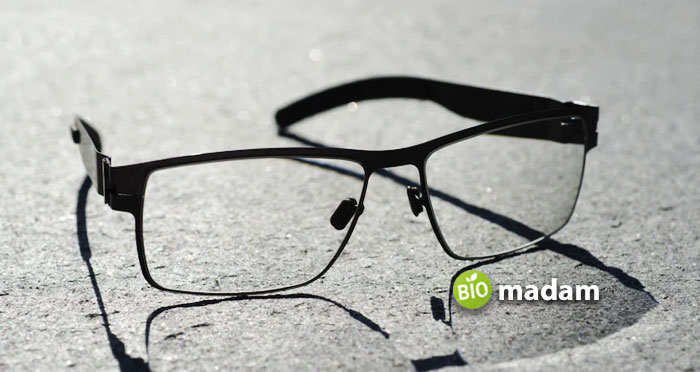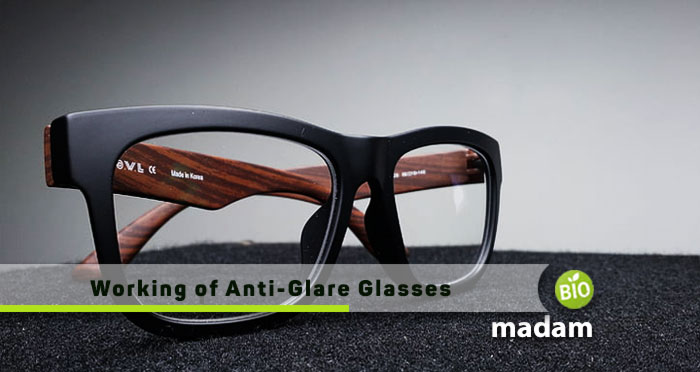Around 6.8 billion people worldwide use smartphones, and 47% of the global population has a computer. Studies also show that 24 million adults in the USA use a computer at work and at home. Technology has revolutionized work dynamics, leading to eye strain due to long hours of being in front of the screen. Many people have started to opt for anti-glare glasses to prevent strain on their eyes and work conveniently. But then, the question arises, “do anti-glare glasses work?” People who do not have near-sightedness or far-sightedness do not typically want to wear glasses. So, they are keen to know whether these glasses work.
Let’s tell you all about anti-glare glasses and their benefits.
What are Anti-Glare Glasses?
Anti-glare glasses have lenses with a specific coating material that reduces the light entering the lens and, eventually, your eyes. Anti-glare glasses have a coating on the outer side, contrary to anti-reflective glasses. They protect you from the light reflection in your surroundings and help keep your vision intact. It can block as much as 99.5% of the incoming light to your eyes. Controlling the amount of light entering the lens makes reflections invisible, and you can get a better image. Anti-glare glasses are suitable for long hours of computer and mobile phone use; you can get anti-glare-coated eyesight glasses as well.
Glare and reflection can be hazardous to the eyes. Besides rays from computer screens, extended exposure to UV light may also lead to diseases and disorders of the eyes. Common issues associated with glares and reflections include dryness, loss of elasticity, and disturbed vision. Anti-glare glasses can help protect from these issues.
How do Anti-Glare Glasses Work?
Anti-glare glasses are used in spectacles, compound and electron microscopes, telescopes, and camera lenses to avoid glare and improve imaging. They are made of metal oxide layers applied to one or both sides of the lens. As our brain produces images due to the bouncing of light, a lot of light entering your eyes can affect the quality of the images. Apart from high-intensity light, dim environments may also impact imaging. The metal oxide coating covers the lenses to control the amount of light passing through the lens.

Benefits of Anti-Glare Glasses
Improved Vision
The most critical benefit of anti-glare glasses is improved vision. Removing glare from the light allows adequate light to reach your eyes and provides better vision.
UV Protection
The metal oxide coating on the glasses helps you protect from UV rays that may otherwise harm your eyes. You can opt for photochromic technology or polarization technique to improve protection against UV rays. Anti-glare glasses may also help reduce exposure to blue light from LED screens.
Reduced Eye Strain
Long exposure to the blue light of digital devices or UV rays can damage your eyes and exhibit signs and symptoms like eye strain, headache, blurred vision, etc. Glares can lead to squinting of your eyes and may cause esotropia.
Long-Lasting
These lenses do not receive scratches easily as they often contain an anti-scratch layer besides an anti-glare coating. Advanced technologies like the non-peel technology fuse the anti-glare coating into the lens during manufacturing to improve durability.
Low-Maintenance
These glasses are quite low maintenance as you do not have to clean them multiple times daily. Clean them when you feel that the lenses have dirt or watermarks. Use warm water and mild soap to clean the lenses. Alternatively, you may use a non-alcoholic spray cleaner. Pat dry the lenses with a microfiber cloth to prevent scratches on the lens.
Looks Better
One of the most important factors to consider when finding the right glasses is to see if they look nice on you. While you pick a suitable frame, these glasses ensure that you always look your best. The lenses stay clean because of the coating, and your eyes are better visible behind the lenses. The coating also keeps watermarks and smudges away.
Drawbacks of Anti-Glare Glasses
Anti-glare glasses are undoubtedly an excellent choice for anyone who works long hours on their smartphone or computer. However, they also have some drawbacks in particular conditions. Some of the disadvantages of anti-glare glasses are:
Prone to Damaged
Though anti-glare glasses are low-maintenance, you must take care of them and keep them in their case, or they may receive scratches or peels.
Coating Removal
The anti-glare coating may wear off over time, and you must replace the glasses.
Unrepairable
Opposed to conventional glasses, anti-glare glasses are not repairable. If you observe numerous scratches or peels on your lens, you will have to get them replaced.
Expensive
Anti-glare glasses are more technologically advanced and make use of the latest techniques. Thus, they are more expensive compared to your regular glasses.
Are Anti-Glare Glasses Worth it?
Despite looking at the benefits of the glasses, you might be wondering, “are anti-glare glasses worth it?” Anti-glare glasses are usually 50% more expensive than regular uncoated glasses. Their manufacturing costs add to the overall costs, leading to a higher price. But they are a hundred percent worth every penny if you regularly feel a strain on your eyes. The anti-scratch layer increases the lifetime of your glasses, so you do not have to buy them frequently.
Choosing the Right Anti-Glare Glasses
Buying anti-glare glasses is not as complicated as it may seem. However, understanding your options can help you pick the best one according to your needs. Here are a few factors you must consider when buying anti-glare glasses:
- Pick a lens type that will suit you the best according to the of your eyes. Consulting your eye care professional is vital to choose the right lens for your eyes.
- Choose an anti-glare coating that suits your needs. You can choose from the standard coating or opt for anti-glare glasses with UV protection.
- Ask the optician about anti-scratch, anti-glare glasses to ensure your glasses do not lose their newness for a long time.
- Select a frame that suits your face and enhances your facial features. You can try frames on online applications or ask your optician about them.

Anti-Glare vs Anti-Reflective
Often anti-glare and anti-reflective glasses are considered the same, and people pick the other due to a lack of knowledge. Let us tell you that anti-glare and anti-reflection glasses are not entirely the same.
Anti-glare glasses are made to deal with external light, like high-intensity light in the surroundings or bright sunlight. On the other hand, anti-reflective glasses protect both internal and external light sources.
The Bottom Line
We hope you have gotten your answer to “Do anti-glare glasses work.” Anti-glare glasses are the perfect choice for people who work long hours on their computers or feel strain in their eyes when leaving the house. They are coated with metal oxides that help regulate the light passing through the lens and entering the eyes. It helps prevent the worsening of the condition of your eyes. Choosing the right anti-glare glasses can help you see clearer, and you do not have to worry about cleaning them all the time. They are more durable and reduce strain on your eyes.
FAQs
Do anti-glare glasses work for night driving?
Anti-glare glasses can be an appropriate choice for night driving as they improve vision by reducing glare and allowing more light to enter.
Is anti-glare good for eyes?
Anti-glare glasses have become a favorite to protect eyes, especially among people who feel strained under the bright sun or work on computers or mobile phones for long hours. They offer a clearer vision and improve the quality of the images.
How long does anti-glare last?
On average, anti-glare glasses last between two to five years. It is suggested to replace your anti-glare glasses after two years as the coating may start coming off. Make sure to keep the glasses in their case to protect them from scratches. Cleaning them with a microfiber cloth may also improve their longevity.

Jeannie has achieved her Master’s degree in science and technology and is further pursuing a Ph.D. She desires to provide you the validated knowledge about science, technology, and the environment through writing articles.

